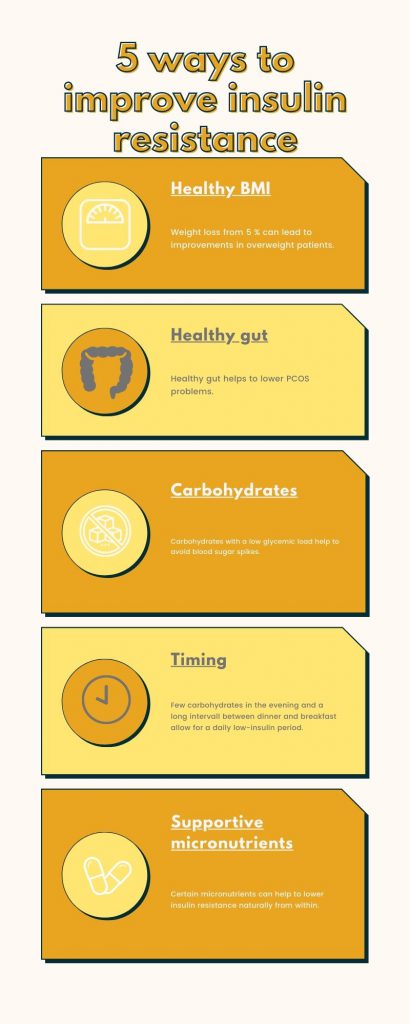Polycystic Ovary Syndrome
5-10% of women of childbearing age suffer from polycystic ovarian syndrome (PCOS). This term stands for numerous symptoms that reflect severe alterations of patients‘ metabolism and hormonal system. Those affected usually have an excessive amount of male hormones and the ratio of the hormones FSH and LH is altered, too. This leads to disturbances in the female cycle: ovulation becomes less frequent, which is noticeable through irregular or absent menstrual bleeding. Particularly problematic: PCOS is one of the most common causes of infertility. Less serious, but all the more stressful in everyday life, are other typical symptoms such as blemished skin, hair growth in unwanted places (the specialist calls it hirsutism) and excessive weight gain.
Insulin resistance
Another frequent problem is insulin resistance, which means that the blood sugar hormone insulin can no longer work properly. It is a risk factor for the development of serious problems such as diabetes and also significantly exacerbates PCOS.
A combination of predisposition and lifestyle is suspected to be the trigger for insulin resistance. Whenever we consume carbohydrates, these are broken down into sugars, which are then brought to our body‘s cells via the blood. High blood sugar levels are the signal for our blood sugar hormone insulin to be released from the pancreas. Only when it has been released in sufficient quantity can the cells of our muscles and adipose tissue absorb and process the sugar from the blood.
If a person is overweight and consumes too many carbohydrates, over time the blood sugar hormone insulin can no longer excert its effect on the blood sugar-processing tissues as it should because they have become too used to it – experts speak of insulin resistance. To compensate for this, the pancreas produces significantly more insulin than usual. The problem: Insulin not only regulates the uptake of blood sugar into the cells, it also stimulates the production of male sex hormones. In this way, poor eating habits contribute to the development and progression of PCOS.
5 ways to mitigate insulin resistance
Knowing about the connection between diet, insulin resistance and hormonal imbalance offers a great opportunity: patients can significantly improve insulin resistance and their well-being through a conscious lifestyle and diet as well as some supportive measures (Douglas et al, 2006).
1. Healthy weight
Maintain a healthy weight. This does not mean a slimming craze á la Hollywood, but a healthy, feel-good weight. Because of the close connection between impaired carbohydrate metabolism and PCOS (Sozen et al, 2000), weight loss is the first step in overweight women (Bates et al, 1982). The good news: A weight loss of just 5% can bring noticeable improvements. Weighing 80 kg, this corresponds to only 4 kg – you can do this! The reward: more even skin, less facial hair growth, more regular cycles.
The typical western diet high in refined carbohydrates (sugar, white flour, baked goods and pasta), but only few fiber and vital substances, is considered problematic and contributes to the development of obesity. It is therefore advisable to change your nutrition to a diet with lots of vegetables, fruit, high-quality proteins and moderate amounts of carbohydrates. You can find detailed tips on weight loss with PCOS in our article: https://my-fertility-blog.com/2019/09/13/pcos-losing-weight-easier-with-tricks-from-research/
2. Gut health
Improving gut health of PCOS patients has long been advocated by naturopaths and alternative medicine practitioners. It is well known that animals with PCOS have altered intestinal flora, the restoration of which can lead to a significant improvement in symptoms. The relationship between gut health and PCOS has been researched in humans, too (Tremellen et al, 2012, Yanjie et al, 2016). Fortunately, it is not that difficult to do something for gut health. Take your time for your meals, chew in peace. Give your gut bacteria enough fiber to live on. Fine fiber from whole wheat flour, vegetables, tender oat flakes or legumes are recommendable. Also good: every now and then new “colleagues” for your intestinal flora. Common fermented foods contain life bacteria and include kimchi, sauerkraut, kefir, tempeh, kombucha, and yogurt. A varied diet with many different vegetables, fruits, whole grains and legumes promotes bacterial diversity.
3. Good carbohydrates
To reduce insulin resistance, patients with PCOS should choose carbohydrates with a low glycemic index. This way, spikes in blood sugar and insulin levels do not occur in the first place.
The glycemic index (GI) is a measure of how quickly and how much a food causes blood sugar to rise. The reference is glucose. It causes the greatest increase in blood sugar. Differences in blood sugar increases are partly due to the fact that the body processes carbohydrates from different foods at different speeds. Simple carbohydrates, such as sugar, pass quickly from the intestine into the blood, so that the blood sugar level soars. Complex carbohydrates, such as those found in whole grains, are different. It takes longer for the digestive system to process them, so the increase in blood sugar is much slower.
As a guideline, it can be said that foods that contain a lot of quickly usable carbohydrates usually also have a high GI. In addition to whole grain products with a lot of fiber, foods with high fat or protein content slow down the rise in blood sugar as well. The method of preparation changes the glycemic index, too. A simple rule of thumb: the more processed a food, the higher the GI.
Just as important as the GI is the total carbohydrate content. An example: cooked carrots have a high glycemic index, but generally contain few carbohydrates, so that the GI is less important for them than, for example, for potatoes.
The so-called glycemic load of a food is therefore often more meaningful: This value relates to both the quality as well as the quantity of carbohydrates.
It should also be noted that a low glycemic index is no guarantee that a meal is completely healthy. Dark chocolate, for example, is in the lower range in terms of the glycemic index. But it contains a lot of fat and calories…

4. The timing
Breakfast like a king, lunch like a farmer and dinner like a beggar – this old adage is more relevant than ever when it comes to insulin levels and carbohydrate consumption (Okauchi et al, 2018). Science has shown that the human internal clock controls many hormone levels during the day, and this also applies to insulin: In the evening, insulin sensitivity is lower than in the morning (Carrasco-Benso et al, 2016).
In practical terms, this means that carbohydrates are best consumed for breakfast and in moderation for lunch. In the evening, it makes sense to limit consumption. Also make sure to have the last meal about 3 hours before bedtime and ideally take a break of about 12 hours between the evening meal and breakfast. This ensures daily periods of low insulin, which have a positive effect on your entire hormonal and metabolic situation.
What if I had a late dinner? No problem, you simply add an extra portion of physical activity: Dancing, a gentle work-out or just a nice evening stroll are now the right things to do!
5. Extra support
Due to the close connection between metabolism and PCOS, targeted supplementation of certain micronutrients can to provide valuable support.
Inositols
Inositols are so-called “second messengers”: the blood sugar hormone insulin needs them in order to be able to fully develop its effect in target cells. Studies have shown that inositols are as effective as metformin at lowering insulin resistance, without any side effects (Fruzzetti et al, 2017). Two variants of inositol, namely myo-inositol and D-chiro-inositol, have been thoroughly investigated in numerous studies (Unfer et al, 2017). If you want to have children, you should ensure that significantly more myo-inositol than D-chiro-inositol is used for optimal support of the ovarian function (Garg and Tal, 2016).
Chromium
Chromium has long been known as a helpful trace element for regulating blood sugar and insulin levels. Unfortunately, when you are stressed or when you consume a lot of carbohydrates, it is used up particularly quickly – and usually in higher amounts than can be supplied with food.
Chromium is found in brewer’s yeast, meat products, cheese and whole grain products, but also in oysters, spices (especially pepper), nuts and brown sugar (molasses). The degree of processing of some foods plays a special role in the supply of chromium. White (refined) sugar and ground white flour contain 90 percent less chromium than molasses and whole wheat grains. Fruits and many vegetables are also quite low in chromium.
The German Nutrition Society assumes that adolescents and adults have a daily requirement of 30 to 100 µg chromium. To cover this need, you can consume 200 g lentils or 300 g wholemeal bread, for example.
Scientific studies confirm: a regular supply of chromium has a measurably beneficial effect on PCOS (Jamilian and Asemi 2015, Jamilian et al, 2016).
Vitamin D
In a 2008 national consumption study in Germany, 91% of women did not reach the recommended daily intake of vitamin D. This is particularly problematic for PCOS patients, as vitamin D deficiency can promote insulin resistance on the one hand (Krul-Poel et al, 2013) and, on the other hand, the vitamin D status has an influence on achieving a healthy pregnancy.
Therefore, PCOS patients should have their vitamin D status checked regularly and adjust their vitamin D intake if necessary (Lagowska et al, 2018).
Carnitine
Carnitine is a naturally occurring compound, which plays an essential role in the cells’ energy metabolism. Patients with polycystic ovary syndrome often have significantly lower carnitine levels than healthy women (Fenkci et al, 2008). Incidentally, this applies to both overweight and normal-weight PCOS patients (Celik et al, 2017). According to studies, a good carnitine supply can be helpful to support weight loss programs and normalize insulin levels (Samimi et al, 2016).
Interesting for PCOS patients who want to have children: a study from 2014 has found that carnitine supplementation in PCOS patients on clomiphene treatment significantly improved the pregnancy rate (Ismail et al, 2014).
Incidentally, side effects have never been observed. While there should be a warning against excessive hopes due to the low number of patients in the studies, it cannot hurt to ensure adequate care.
You should consume 1 to 3 grams of L-carnitine daily with your food. Small amounts can be found in pasta, broccoli and potatoes. Foods with a high L-carnitine content include meat, fish and dairy products.
Coenzyme Q10
Coenzyme Q10 plays an important role in cellular energy supply. Consequently, you can promote your energy level with plenty of coenzyme Q10. It is found in fish and seafood, as well as in internal organs. However, many women also like to use dietary supplements. In PCOS patients, this food supplement can stimulate and improve metabolism (Samimi et al, 2016). The positive effect on carbohydrate metabolism in particular can help to gently improve insulin resistance.
Antioxidants
Patients with PCOS often have increased oxidative stress. This is partly a consequence of the disease, but at the same time makes it worse by exacerbating insulin resistance. It is therefore important to ensure that you have a very good supply of valuable, protective antioxidants (Amini et al, 2015).
The best-known antioxidants are certainly the vitamins C and E. Fresh, fully ripe fruit and vegetables in combination with nuts and seeds are ideal sources.
Ideally, you consume at least 5 servings of fruit and vegetables a day (one serving corresponds to around 125 g or the size of your fist), with all traffic light colors, or even better all rainbow colors, represented.
N-acetyl-L-cysteine (NAC)
N-acetyl-cysteine (NAC) is a particularly powerful antioxidant. Strictly speaking, it is a slightly modified and more stable form of the naturally occurring protein building block cysteine. Cysteine itself is found in most protein-rich foods. Meat and fish contain it as well as dairy products. Vegans get cysteine from plant-based foods such as oatmeal, as well as from vegetables such as broccoli, peppers or onions.
The more stable NAC has been available as a dietary supplement for a long time. Its importance comes from the fact that it is a precursor for the body’s own production of glutathione. Glutathione, in turn, is one of the most important antioxidants in the body. Not surprisingly, the use of NAC has already been scrutinized for the treatment of a wide range of health problems, from heart to mental health. Studies of its importance in polycystic ovary syndrome are relatively new. Here it was shown: A treatment with NAC can significantly improve the metabolism, the hormonal balance and the regularity of ovulation (Thakker et al, 2015; Badawy et al, 2007).
Interesting for PCOS patients who wish to have children: According to scientific studies, treatment with NAC can also contribute to significant improvement in the quality of the egg cells in PCOS patients (Cheraghi et al, 2016; Cheraghi et al, 2018).
Product tip: Fertilovit F PCOS contains all the micronutrients mentioned above in a specifically developed combination.
References
Douglas CC et al. Role of diet in the treatment of polycystic ovary syndrome. Fertil Steril 2006 85(3):679-88
Sozen I, Arici A. Hyperinsulinism and its interaction with hyperandrogenism in polycystic ovary syndrome. Obstet Gynecol Surv. 2000 May;55(5):321-8.
Bates GW, Whitworth NS. Effect of body weight reduction on plasma androgens in obese, infertile women. Fertil Steril. 1982 Oct;38(4):406-9.
Tremellen K, Pearce K. Dysbiosis of Gut Microbiota (DOGMA)–a novel theory for the development of Polycystic Ovarian Syndrome. Med Hypotheses. 2012 Jul;79(1):104-12.
Yanjie Guo et al. Association between Polycystic Ovary Syndrome and Gut Microbiota. PLoS One. 2016; 11(4): e0153196
Okauchi H et al. Timing of food intake is more potent than habitual voluntary exercise to prevent diet-induced obesity in mice. Chronobiol Int. 2018 Sep 13:1-18.
Carrasco-Benso MP et al. Human adipose tissue expresses intrinsic circadian rhythm in insulin sensitivity. FASEB J. 2016 Sep;30(9):3117-23.
Fruzzetti F et al. Comparison of two insulin sensitizers, metformin and myo-inositol, in women with polycystic ovary syndrome (PCOS). Gynecol Endocrinol. 2017 Jan;33(1):39-42.
Unfer V et al. Myo-inositol effects in women with PCOS: a meta-analysis of randomized controlled trials. Endocr Connect. 2017 Nov;6(8):647-658.
Garg and Tal. Inositol Treatment and ART Outcomes in Women with PCOS. Int J Endocrinol 2016; 2016:1979654
Jamilian and Asemi Z. Chromium Supplementation and the Effects on Metabolic Status in Women with Polycystic Ovary Syndrome: A Randomized, Double-Blind, Placebo-Controlled Trial. Ann Nutr Metab. 2015;67(1):42-8
Jamilian et al.The Effects of Chromium Supplementation on Endocrine Profiles, Biomarkers of Inflammation, and Oxidative Stress in Women with Polycystic Ovary Syndrome: a Randomized, Double-Blind, Placebo-Controlled Trial. Biol Trace Elem Res. 2016 Jul;172(1):72-8
Cutler DA et al. Low intakes of dietary fiber and magnesium are associated with insulin resistance and hyperandrogenism in polycystic ovary syndrome: A cohort study. Food Sci Nutr. 2019 Feb 27;7(4):1426-1437. doi: 10.1002/fsn3.977. eCollection 2019 Apr.
Cerqueira JM et al. Homocysteinemia in polycystic ovary syndrome women. Rev Bras Ginecol Obstet; 2010; 32(3):126-132
Krul-Poel YH et al. The role of vitamin D in metabolic disturbances in polycystic ovary syndrome: a systematic review. Eur J Endocrinol. 2013; 169(6):853-65
Łagowska K et al. The Role of Vitamin D Oral Supplementation in Insulin Resistance in Women with Polycystic Ovary Syndrome: A Systematic Review and Meta-Analysis of Randomized Controlled Trials. Nutrients. 2018 Nov 2;10(11).
Fenkci SM et al. Serum total L-carnitine levels in non-obese women with polycystic ovary syndrome. Hum Reprod. 2008 Jul;23(7):1602-6.
Celik F et al. Plasma L-carnitine levels of obese and non-obese polycystic ovary syndrome patients. J Obstet Gynaecol. 2017 May;37(4):476-479.
Samimi M et al. Oral carnitine supplementation reduces body weight and insulin resistance in women with polycystic ovary syndrome: a randomized, double-blind, placebo-controlled trial. Clin Endocrinol (Oxf). 2016 Jun;84(6):851-7.
Ismail AM et al. Adding L-carnitine to clomiphene resistant PCOS women improves the quality of ovulation and the pregnancy rate. A randomized clinical trial. Eur J Obstet Gynecol Reprod Biol. 2014 Sep;180:148-52.
Nadjarzadeh A et al. Effect of Omega-3 Supplementation on Visfatin, Adiponectin, and Anthropometric Indices in Women with Polycystic Ovarian Syndrome. J Reprod Infertil 2015; 16(4):212-220.
Oner G, Muderris II. Efficacy of omega-3 in the treatment of polycystic ovary syndrome. J Obstet Gynaecol. 2013; 33(3):289-91.
Phelan N et al. Hormonal and metabolic effects of polyunsaturated fatty acids in young women with polycystic ovary syndrome: results from a cross-sectional analysis and randomized, placebo-controlled, crossover trial. Am J Clin Nutr 2011; 93:652-62.
Samimi et al.The effects of coenzyme Q10 supplementation on glucose metabolism and lipid profiles in women with polycystic ovary syndrome: a randomized, double-blind, placebo-controlled trial. Clin Endocrinol (Oxf). 2016 Dec 2.
Amini L et al. Antioxidants and management of polycystic ovary syndrome in Iran: A systematic review of clinical trials. Iran J Reprod Med. 2015 Jan;13(1):1-8.
Thakker D et al. N-acetylcysteine for polycystic ovary syndrome: a systematic review and meta-analysis of randomized controlled clinical trials. Obstet Gynecol Int. 2015; 2015:817849.
Badawy A et al. N-Acetyl cysteine and clomiphene citrate for induction of ovulation in polycystic ovary syndrome: a cross-over trial. Acta Obstet Gynecol Scand. 2007;86(2):218-22.
Cheraghi E et al. N-Acetylcysteine improves oocyte and embryo quality in polycystic ovary syndrome patients undergoing intracytoplasmic sperm injection: an alternative to metformin. Reprod Fertil Dev. 2016 Apr;28(6):723-31.
Cheraghi E et al. N-Acetylcysteine Compared to Metformin, Improves The Expression Profile of Growth Differentiation Factor-9 and Receptor Tyrosine Kinase c-Kit in The Oocytes of Patients with Polycystic Ovarian Syndrome. Int J Fertil Steril. 2018 Jan;11(4):270-278.
.







